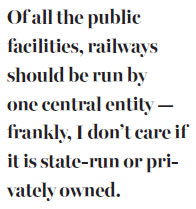British railways have run out of steam

No light at the end of the tunnel for a transport system that once was the undisputed world leader
If you want to travel from Kunming to Shanghai, a mere 2,252 kilometers, it will take you 11 hours and 15 minutes- and you can bet your fancy high-speed train will be right on time.
If you want to travel the 664 km from London to Edinburgh, it will take you nearly five hours, the train may well be delayed and you will have to pay extra to guarantee a seat.
Traveling on China's new high-speed, state-of-the-art trains costs you an average of 100 yuan an hour, travelling at around 350 km/h. Roughly put, it means the ticket between Kunming and Shanghai should cost you around 1,115 yuan, around 130 ($159; 152.6 euros) at current rates. Don't ask me how I know this stuff - I just do.
Taking that nightmare London-Edinburgh route - and it can be a nightmare - will cost you around 150.
For a country that invented railways (1825, George Stephenson's Stockton-to-Darlington line in northeast England, since you ask), Britain has made a pretty poor job of it in recent years.

And if strikes, delayed engineering works, malfunctioning signals and poor infrastructure weren't enough, the government has just announced a 2.3 percent rise in rail fares across the board.
I commute to work every day and, as things go, I'm luckier than most. Southeastern, which operates my service, is a little better than some of the other operators, although each time I climb the stairs from the car park I seem to be greeted by "Southeastern apologizes for ", followed by the latest delay, excuse or cancellation.
Reasons offered include unruly passengers, ice, snow, rain, leaves on the line, missing train crew and, believe it or not, strong winter sunshine in the drivers' eyes.
I've always loved trains, especially the mystery of steam. I confess to having a box full of Hornby Dublo model engines, those splendidly made electric models of the golden era of British steam. I have beautifully detailed models of the Flying Scotsman, the Duchess of Hamilton and designer Sir Nigel Gresley's Mallard, a streamlined monster that set the world speed record for a steam engine in 1938 and has never been beaten.
I suppose it goes back to my childhood in the 1950s, when my father would take my mother and his sister by car (a 1937 Austin 14) from Oxford to Hartlepool, while we boys would go with my uncle by steam train, changing at Darlington for the two-hour run to West Hartlepool.
What a trip - Mars bars, pork pies, fizzy drinks and a fresh comic book for the journey. Boyhood heaven.

All that, of course, was spoiled by a gentleman called Dr Richard Beeching, whose 1963 report on the state of Britain's railways resulted in a shortsighted slashing of 2,636 stations and 5,000 miles of track.
I personally don't think the system has ever recovered.
Since then, the nation's rail network has become a political football.
Of all the public facilities, railways should be run by one central entity - frankly, I don't care if it is state-run or privately owned.
After all, China, France and Germany, to name but a few places, all have one entity controlling their rail systems and it seems to work for them.
Here, although the infrastructure is run by Network Rail, the services are run by a series of franchises awarded by the government, with varying degrees of success.
Try to buy a ticket and you will be faced with a bewildering array of choices.
No wonder many Britons opt to drive, overcrowding the motorways and adding to pollution.
Next time I'm in China, China Railway Co will be getting my business, that's for sure.
The author is managing editor of China Daily European Bureau. Contact the writer at chris@mail.chinadailyuk.com
(China Daily Africa Weekly 01/06/2017 page11)
Today's Top News
- Crossing a milestone in the journey called Sinology
- China-Russia media forum held in Beijing
- Where mobility will drive China and the West
- HK community strongly supports Lai's conviction
- Japan paying high price for PM's rhetoric
- Japan's move to mislead public firmly opposed






























